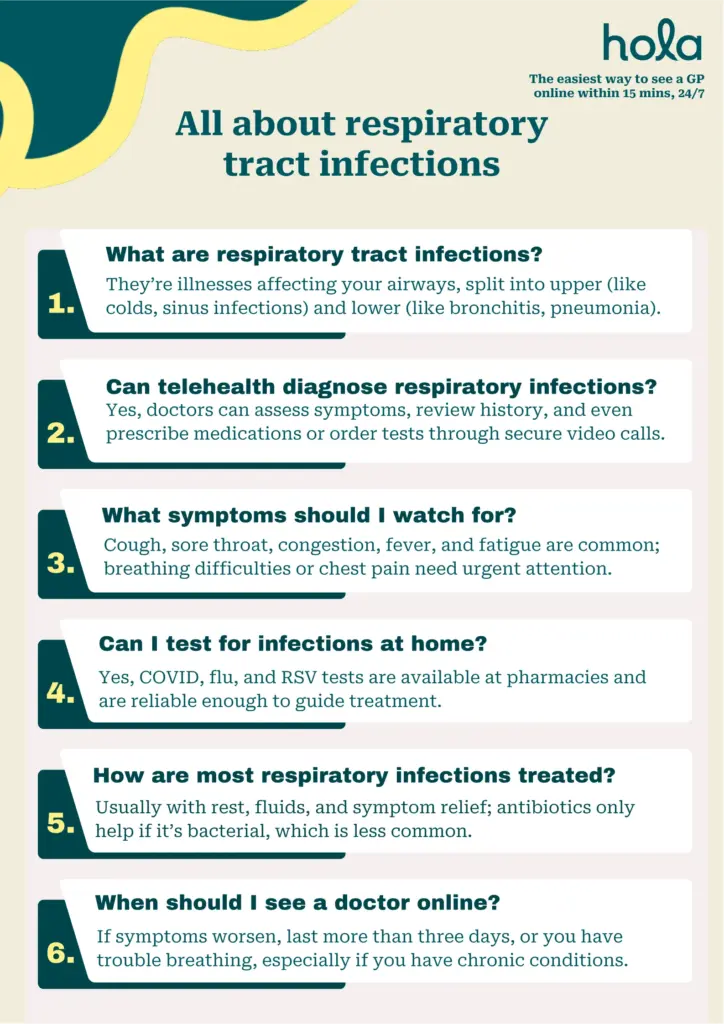Can I do telehealth for a respiratory infection?
Written by Dr Nelson Lau, MBBS FRACGP, GP & Digital Health Specialist.

Contents

What is a respiratory tract infection?
That familiar scratchy throat hits you at 7AM. Your nose is completely blocked, and you feel like you've been hit by a truck. Five years ago, this meant calling in sick, dragging yourself to a crowded waiting room, and hoping your doctor could squeeze you in. These days? You might handle the whole thing from your kitchen table. Telehealth has completely changed how we approach common illnesses, but many people wonder: can you really diagnose and treat a respiratory infection through a screen?
Types of respiratory tract infections
Respiratory tract infections fall into two main categories. Upper respiratory infections hit your sinuses, throat, and upper airways—we're talking about your garden-variety cold, sinus infections, and strep throat. Lower respiratory infections are more serious business: bronchitis, pneumonia, and other conditions that affect your lungs directly. These infections account for millions of doctor visits every year, especially when everyone's coughing and sneezing from April through to October.Common symptoms
The symptoms usually overlap quite a bit. You'll probably have some combination of coughing, sore throat, congestion, fever, and that bone-deep exhaustion that makes you want to sleep for three days straight. Lower respiratory infections often come with chest tightness and trouble breathing—those are the red flags that mean you need immediate attention.What kind of services are available through telehealth?
You may not be aware, but doctors can accomplish quite a lot through a video call. They'll walk through your symptoms in detail, check out any visible issues (like how red your throat looks or whether your lymph nodes seem swollen), and review your medical history. Many providers can prescribe medications on the spot if needed. They can also order tests, refer you for X-rays if they're concerned about pneumonia, or send you to get blood tests done. For straightforward cases—which most respiratory infections are—it works surprisingly well. The real game-changer is follow-up care. Instead of taking another day off work to sit in a waiting room for a five-minute check-in, you can hop on a quick video call to see how you're responding to treatment.How can Hola Health help patients suffering from respiratory tract infections?
If you’re dealing with symptoms of a respiratory tract infection such as a persistent cough, sore throat, nasal congestion, fever, or shortness of breath, Hola Health makes getting help easy and convenient. Here's how Hola can help with respiratory tract infections through telehealth appointments in Australia, you can:
- Book an online doctor appointment for respiratory tract infection treatment anytime, day or night.
- Receive online prescriptions for sent directly to your phone.
- Get online infection medical certificate for work or school for viral respiratory infections like the common cold, flu, or COVID-19 without leaving home
- Get online pharmacy delivery for prescription medications or over-the-counter medications.
- Request online doctor referrals in Australia for specialist consultations, pathology referrals, radiology referrals and more.
Can I get a respiratory infection test at home?
Remember when getting tested meant a trip to urgent care and waiting hours for results? Now you can test for COVID, flu, RSV and other viruses at home. You can buy these tests over the counter at any pharmacy. The accuracy has improved dramatically too. While these tests aren't perfect, they're reliable enough to guide treatment decisions and help you figure out whether you're contagious.Feeling sick and unsure why? Speak with a GP online in 15 minutes.
Common respiratory infections
Most respiratory infections are caused by viruses, which means antibiotics won't help. The common cold typically makes you miserable for about a week, then gradually fades. The flu hits harder and faster—you'll know the difference because flu makes your whole-body ache like you've run a marathon. COVID is still circulating and can look identical to other respiratory infections, which is why testing matters. Bronchitis gives you that persistent, nagging cough that seems to last forever. Pneumonia is the serious one that can land you in the hospital, especially if you're older or have other health conditions. RSV usually isn't a big deal for healthy adults, but it can be dangerous for babies and elderly people who are more vulnerable.Treatment & prevention
Here's what most people don't realise: the vast majority of respiratory infections don't need prescription medication. Your body handles them just fine on its own. Treatment is mostly about staying comfortable while you recover. That means plenty of rest, lots of fluids, and medications recommended by the doctor for symptom relief. Prevention is straightforward but actually works wash your hands constantly, stay away from sick people when possible, get your annual flu shot, and keep up with COVID boosters. Good ventilation in shared spaces helps too.When to see a doctor online for respiratory tract infections?
Most respiratory infections resolve without medical intervention, but there are definitely times when you should reach out to a healthcare provider. If your fever sticks around for more than three days, if you're having trouble breathing, or if you start feeling better and then suddenly get worse again, those are all reasons to get checked out. People with asthma, diabetes, or other chronic conditions should have a lower threshold for seeking care. When in doubt, a quick telehealth consultation can give you peace of mind and help you avoid unnecessary trips to urgent care.The bottom line
Telehealth works well for most respiratory infections. It's convenient, usually less expensive than in-person visits, and you don't have to expose other people to whatever you've got. While it's not going to replace emergency care for serious infections, it handles the everyday stuff quite effectively. The technology keeps improving, home testing is becoming more accessible, and providers are getting better at virtual assessments. For common respiratory infections, your living room might just be the best place to start your recovery.15 minutes, anytime, anywhere.
What we treat
- Cough
- Nausea & vomiting
- Fever
- Hayfever
- Fatigue
- Sore throat
- Acne
- Hair loss
- Gout
- Eczema
- Rosacea
- Sunburn
- UTI
- Erectile dysfunction
- Contraception
- Morning sickness
- Morning after pill
- Prostate health
- Anxiety
- Depression
- Stress
- Grief & loss
- Antidepressants
- Premature ejaculation
- Asthma
- Blood pressure
- Blood thinners
- Diabetes
- Cholesterol
- Migraines & headaches
- Allergies
- Body ache
- Heartburn & reflux
- Sleep disorder
- Pain relief
- Gastro
Related Articles
Disclaimer
This blog is for general informational purposes only and does not indicate that Hola Health provides all treatments or preventive measures mentioned. It is not intended to be a substitute for professional medical advice. Always seek the guidance of your doctor or other qualified health professional with any questions you may have regarding your health or a medical condition. For emergencies please immediately contact 000. Any medical topics discussed are intended to educate, not to imply availability through Hola Health.
 Facebook
Facebook  X
X  Copy Link
Copy Link



